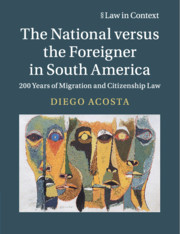Crossref Citations
This Book has been
cited by the following publications. This list is generated based on data provided by Crossref.
Honohan, Iseult
and
Rougier, Nathalie
2018.
Global Birthright Citizenship Laws: How Inclusive?.
Netherlands International Law Review,
Vol. 65,
Issue. 3,
p.
337.
Bauböck, Rainer
2018.
Epilogue: International Norms for Nationality: An Elusive Goal?.
Netherlands International Law Review,
Vol. 65,
Issue. 3,
p.
497.
de Groot, Gerard-René
and
Vonk, Olivier
2018.
Acquisition of Nationality by Birth on a Particular Territory or Establishment of Parentage: Global Trends Regarding Ius Sanguinis and Ius Soli.
Netherlands International Law Review,
Vol. 65,
Issue. 3,
p.
319.
Bryce, Benjamin
2019.
Undesirable Britons: South Asian Migration and the Making of a White Argentina.
Hispanic American Historical Review,
Vol. 99,
Issue. 2,
p.
247.
Klabbers, Jan
and
Palombella, Gianluigi
2019.
The Challenge of Inter-Legality.
Acosta, Diego
and
Brumat, Leiza
2020.
Political and Legal Responses to Human Mobility in South America in the Context of the Covid-19 Crisis. More Fuel for the Fire?.
Frontiers in Human Dynamics,
Vol. 2,
Issue. ,
Weinar, Agnieszka
and
Klekowski von Koppenfels, Amanda
2020.
Highly-Skilled Migration: Between Settlement and Mobility.
p.
37.
Jesse, Moritz
2020.
European Societies, Migration, and the Law.
Finn, Victoria
and
Umpierrez de Reguero, Sebastián
2020.
Inclusive Language for Exclusive Policies: Restrictive Migration Governance in Chile, 2018.
Latin American Policy,
Vol. 11,
Issue. 1,
p.
42.
Mertens, Thomas
2020.
A Philosophical Introduction to Human Rights.
Velázquez, Mariana-Cecilia
2020.
Maritime predation between the lines: charting the insular Caribbean in the sixteenth century.
Canadian Journal of Latin American and Caribbean Studies / Revue canadienne des études latino-américaines et caraïbes,
Vol. 45,
Issue. 3,
p.
400.
Brumat, Leiza
2020.
Regional Integration and Migration Governance in the Global South.
Vol. 20,
Issue. ,
p.
153.
La Barbera, MariaCaterina
2020.
“Vivir entre fronteras”: vulnerabilidad y transformación de la identidad en la era de la globalización.
Bajo Palabra,
p.
261.
da Silva, Leonardo Cavalcanti
and
Villarreal Villamar, María del Carmen
2020.
Routledge Handbook of Migration and Development.
p.
536.
Bauloz, Céline
Vathi, Zana
and
Acosta, Diego
2020.
6 Migration, inclusion and social cohesion: Challenges, recent developments and opportunities.
World Migration Report,
Vol. 2020,
Issue. 1,
van der Baaren, Luuk
and
Vink, Maarten
2021.
Modes of Acquisition and Loss of Citizenship Around the World - Comparative Typology and Main Patterns in 2020.
SSRN Electronic Journal ,
Blouin, Cécile
2021.
Complejidades y contradicciones de la política migratoria hacia la migración venezolana en el Perú.
Colombia Internacional,
p.
141.
Acosta, D.
2021.
Regional Free Movement of People at the Global Level: The Case of the Eurasian Economic Union (EAU).
Kutafin Law Review,
Vol. 8,
Issue. 4,
p.
602.
Cabrera, Luis
and
Byrne, Caitlin
2021.
Comparing organisational and alternative regional citizenships: the case of ‘Entrepreneurial regional citizenship’ in ASEAN.
Australian Journal of International Affairs,
Vol. 75,
Issue. 5,
p.
507.
Cranston, Ross
2021.
Making Commercial Law through Practice 1830–1970.



